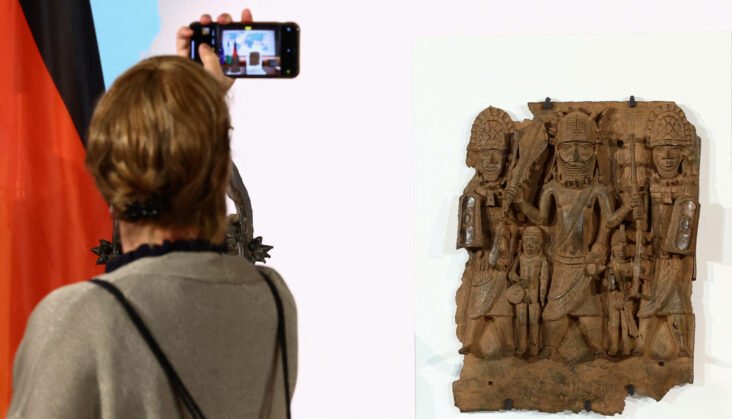[ad_1]
The collection includes 12 brass plaques known as Benin Bronzes, which were looted by British soldiers in 1897 from Benin City, now located within the Federal Republic of Nigeria.
Prof Abba Tijani, director-general of Nigeria’s National Commission for Museums and Monuments (NCMM), welcomed the return of the artefacts that were created from at least the 16th century onwards in the West African Kingdom of Benin by specialist guilds working for the royal court of the oba (king).
He said: “We very much welcome this decision by the Trustees of the Horniman Museum and Gardens. Following the endorsement by the Charity Commission, we look forward to a productive discussion on loan agreements and collaborations between the National Commission for Museums and Monuments and the Horniman.”
Benin’s rich history is reflected in many European collections – with over 900 objects from the historic Kingdom of Benin in the British Museum’s collection. Relics from Benin are also lent regularly around the world.
During the second half of the 19th century, the balance of power between West African kingdoms and the European nations they traded with shifted towards the control of the latter. This led to the territorial land-grab known as the ‘Scramble for Africa’ – the invasion and colonisation of the continent.
Britain’s colonisation efforts eventually led to a clash with the Kingdom of Benin, which British forces seized in February 1897. There are no exact figures for the number of Benin citizens killed in the city’s conquest, nor for the destruction of the many monuments caught in the fire, including the Benin Royal Palace.
This history of eventual slavery and bloody violence, which implicated many countries like Britain, has had an extensive impact on West African societies beyond the removal of their cultural history. The UK has been uncharacteristically quiet when it comes to matters of repatriation and reparations, still failing to issue a statement of apology for many of the colonial and contemporary atrocities committed overseas.
However, many organisations and companies have come forward to admit culpability for their actions in colonisation and the transatlantic slave trade, whose echoes can be heard through racial injustice and inequality that pervades not only between “colonised” and “coloniser” countries but also within more economically prosperous countries like the UK.
Collaborative efforts?
Artefacts like the Benin Bronzes attract tourism and can be a method of generating economic wealth, something West African nations have been deprived of post-colonialism.
As a result, many African leaders and organisations have openly protested their artefacts being held overseas. In October 2021, the British Museum received a written request for the return of ‘Nigerian antiquities’ from the Federal Ministry of Information and Culture in Nigeria.
Representatives of the Benin Royal Palace have made several public statements asking for the Benin collections to be returned, most recently at the Benin Dialogue Group meeting that was hosted by the British Museum in October 2021.
Last month, the Oxford and Cambridge universities agreed to repatriate more than 200 Benin bronze items after formal claims from Nigeria’s NCMM.
Dan Hicks, professor of Contemporary Archaeology at the University of Oxford and author of the book The Brutish Museums: The Benin Bronzes, Colonial Violence and Cultural Restitution, cautiously expresses optimism about the “fundamental change” for museums to look at their artefacts and begin internal and external conversations about their returns.
The idea that you need to hold on to an object in order to explain the history of colonisation […] is not a reason to tell a melancholic story of a country
However, speaking to a spokesperson at the British Museum, it appears as if there is no clear intention to return the artefacts. “The collections also offer an important opportunity for audiences to understand the history of the British conquest of Benin City and to reflect on the impact of this period of colonial history,” the spokesperson tells The Africa Report.
The Museum is a part of the Benin Dialogue Group, a multilateral international collaborative working group that brings together delegates from Western museums with representatives of the Nigerian government, the Royal Court of Benin, and the NCMM. According to the organisation, this initiative will enable them to invest in local communities and exchange knowledge and skills.
“The British Museum remains committed to thorough and open investigation of Benin collection histories. This includes fully understanding the colonial history and the destruction and looting of Benin City by British forces in 1897, which form the key contexts for the development of the Museum’s Benin collections, as acknowledged in the galleries and on the Museum’s website,” the spokesperson says.
Hicks acknowledges that this issue cannot be solved overnight. “I think it’s a great sadness that [there is no] leadership [from] the British Museum – one of the most powerful organisations can repeat the old lines from the 1950s. They [prefer] inaction as they are not bound by the National Heritage Act.”
He says: “The idea that you need to hold on to an object in order to explain the history of colonisation – [an object] that has immense cultural value for Nigeria and across the diaspora – is not a reason to tell a melancholic story of a country – why do we need it? I have no interest in telling Nigerian colleagues what to do with the artefacts – this is a decision for those receiving the artefacts.”
As part of their announcement for the return of the antiques, the Horniman said they “will now discuss with NCMM the process for the formal transfer of ownership, and the possibility of retaining some objects on loan for display, research and education”. It remains to be seen how much of the collection will be returned with no strings attached.
[ad_2]
Source link

